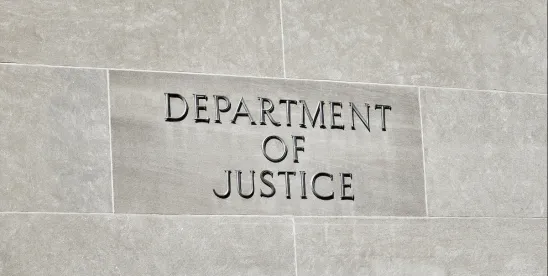On July 14, 2025, the U.S. Department of Justice (DOJ) released guidance that will scale back multilingual services in federal agencies. The guidance aligns with President Donald Trump’s Executive Order No. 14224, which established English as the official language of the United States of America.
Quick Hits
- The DOJ recently issued guidance that narrows the circumstances under which a federal agency’s English-only rule would be considered discrimination on the basis of national origin.
- There must be evidence of an intent to discriminate in order to claim an English-only rule violated federal antidiscrimination laws, according to the guidance.
Title VI of the Civil Rights Act of 1964 prohibits discrimination based on race, color, and national origin in programs and activities that receive federal funding. Historically, the DOJ took the position that Title VI’s prohibition against national origin discrimination included discrimination against people with limited English proficiency. Consequently, according to the DOJ’s prior guidance, the failure to provide language assistance had a disparate impact based on national origin. Now, however, the DOJ “will no longer rely on the Title VI disparate impact regulations and directs other agencies similarly.”
The new guidance instead asserts that language proficiency is not an immutable characteristic and is not interchangeable with national origin or race. While it acknowledges situations in which language might be used as a proxy to intentionally discriminate based on a person’s national origin, it contends that “such cases are rare.” The guidance states, rather, that “[t]he intent to discriminate based on race, color, or national origin must be present to violate Title VI.” (Emphasis in the original.)
The new guidance instructs federal agencies to minimize their nonessential multilingual services to implement Executive Order 14224, which rescinded Executive Order No. 13166, signed by former President Bill Clinton on August 16, 2000. The latter required federally funded programs to provide services and activities with equal access for people with limited English proficiency.
Next Steps
The DOJ guidance does not address the legal obligations of private employers that do not receive federal funding. But more generally, this development likely presages another shift in the enforcement approach of federal agencies with regard to the treatment of language under federal antidiscrimination laws.
In particular, the U.S. Equal Employment Opportunity Commission (EEOC) has traditionally viewed English-only rules in the workplace as potentially violative of Title VII of the Civil Rights Act of 1964’s prohibition on national origin discrimination. Specifically, EEOC regulation 29 C.F.R. § 1606.7(a) states:
A rule requiring employees to speak only English at all times in the workplace is a burdensome term and condition of employment. The primary language of an individual is often an essential national origin characteristic. Prohibiting employees at all times, in the workplace, from speaking their primary language or the language they speak most comfortably, disadvantages an individual’s employment opportunities on the basis of national origin. It may also create an atmosphere of inferiority, isolation and intimidation based on national origin which could result in a discriminatory working environment. Therefore, the [EEOC] will presume that such a rule violates title VII and will closely scrutinize it.
The regulation acknowledges that employers may implement rules requiring the use of English at certain times, so long as they can establish that the rule is justified by business necessity.
In accordance with this regulation, the EEOC has previously brought enforcement actions against employers for promulgating allegedly overly broad English-only rules. For example, just one year ago, the EEOC issued a press release announcing the settlement of a case involving a housekeeping company that allegedly required its employees to speak only English at all times.
But now, the DOJ’s memo rejects the disparate impact theory as applied to assistance for individuals with limited English proficiency and encourages other agencies to do the same. This arises in connection with President Trump’s executive order that directed the EEOC, along with other federal agencies, to deprioritize disparate impact enforcement. Accordingly, it is possible, if not likely, that the EEOC will similarly reject the disparate impact theory in the context of English-only rules. This could result in the loosening of the historical standard that private employers should limit their English-only rules to situations where necessary for safety or business purposes.





 />i
/>i
